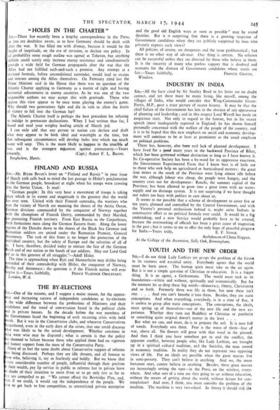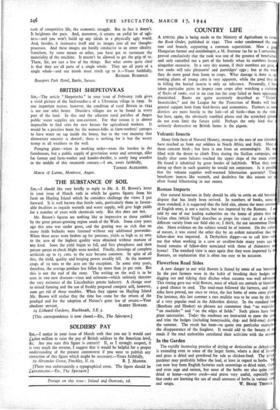YOUTH AND THE NEW ORDER Snt,—I do not think Lady
Lothian yet grasps the problem of the future in its vastness and essential unity. Everybody agrees that the world must be born anew. The human spirit must take to the air again. But it is not a simple question of Christian re-education. It is a bigger thing. It is an agony, a Gethsemane. The world must rock to its foundations—within and without, spiritually and economically. But for the moment let us drop these big words—democracy, liberty, Christianity and so forth. Formerly there was life in them, but now there isn't any. . . . And you can't breathe it' into them. Besides, they are static conceptions. And when everything, everybody, is in a state of flux, it is useless to grasp after static conceptions. The conceptions, the ideals, must spring up of themselves—out of the new life and the new ex- perience. Whether they turn out Buddhist or Christian or pantheist or something quite original doesn't matter in the least . . •
But what we can, and must, do is to prepare the soiL It is now full of weeds. Everybody sees them. Fear is the worst of them—fear of war, above all. No flowers will grow with that weed in the ground. And then I think you have somehow got to end the conflict, the apparent conflict, between people who, like Lady Lothian, are brought up in a spiritual cultural tradition, and the Socialist, the man rooted in economic tradition. In reality they do not represent two opposing views of life. For no ideals are possible when the great masses live in semi-poverty. They can't believe in anything. And we, the more fortunate ones, cannot believe in anything. Besides, these great masses are increasingly setting the tone—in the Press, on the wireless, every- where. And what sort of a tone are they going to set without education, without the means of getting about the world, without leisure for con- templation? And next, I think, you must consider the problem of the machine. The machine is very two-edged. In theory it should still the rush of competitive life, the economic struggle. But in fact it doesn't. It heightens the pace. And, moreover, it creates an awful lot of ugli- ness—and you won't build up any ideals in a physically ugly world. And, besides, it insinuates itself and its images into all our thought- processes. And these images are hardly conducive to an inner ideality. Somehow, by some means or other, you have got to surmount the materiality of the machine. It mustn't be allowed to get the grip of us. These, Sir, are just a few of the things. But what seems quite clear is that they are all parts of a single whole. They are all 'parts of a single whole—and our minds must reach up to it.—Yours faithfully, Beauport Park Hotel, Battle, Sussex. RICHARD RUMBOLD.



























 Previous page
Previous page